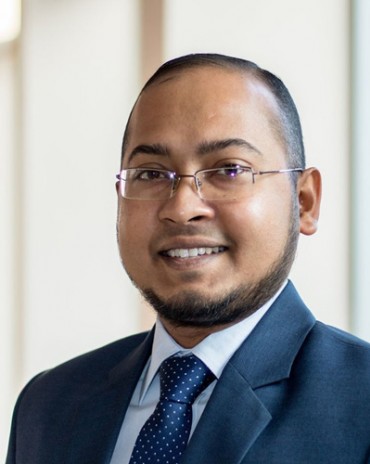Mohammad Hasan

Assistant Professor of Business
Phone Number: 402.826.8678Department: Business Administration
Office: GA411
Email: [email protected]
Primary Campus: Crete
Credentials: MA, MFIN, PHD
Dr. Mohammad Hasan is Assistant Professor of Business in the College of Business. He joined Doane University in 2019 and primarily teaches classes for the following programs: Finance and Business Administration. He earned a Ph.D. in Economics (2020) from Iowa State University and his M.F. (2014) from Central Michigan University as well as his M.B.A. (2010) from the University of Dhaka. Hasan holds certificates in machine learning and chartered financial analysis. His research interests lie in financial economics, international finance, and macro-finance; with emphasis on banking crises, sovereign debt and default, capital structure of corporate firms, and capital market returns.
Education
Ph.D. (Economics), Iowa State University, 2020
M.F. (Finance), Iowa State University, 2017
M.A. (Economics), Central Michigan University, 2014
M.B.A. (Finance), University of Dhaka, 2010
B.B.A. (Finance), University of Dhaka, 2008
Courses
- Finance (BUS 226)
- International Trade and Finance (BUS/ECO 358)
- Investments (BUS 394)
- Financial Institution Management (BUS 445)
- Advance Financial Management (BUS 460)
Professional Experience
Chair of Business-Management Search Committee, 2021-Present
Faculty Development Committee Member, 2020-Present
Faculty Advisor of the Investment Club, 2019-Present
Teaching Experience
Doane University, 2019-present
Iowa State University, 2017-2019
Professional Accolades
Graduate Assistantship, Iowa State University, 2014-2019
Frank Orazem Scholarship, Iowa State University, 2015-2016
Nils Olsen Graduate Scholarship, Iowa State University, 2014-2015
Paul Carl Mathis II Scholarship, Central Michigan University, 2013-2014
Graduate Assistantship, Central Michigan University, 2012-2014
Professional Highlights
- Ali, S. R. M., Ahmed, S., Hasan, M. N., stermark, R. (2021). Predictability of extreme returns in the Turkish stock market. Emerging Markets Finance and Trade, 57(2), 482-494.
- Ali, S. R. M., Hasan, M. N., stermark, R. (2020). Are idiosyncratic risk and extreme positive return priced in the Indian equity market?. International Review of Economics & Finance, 70, 530-545.
- Ali, S. R. M., Rahman, M. A., Hasan, M. N., stermark, R. (2020). Positive IVOL-MAX effect: A study on the Singapore Stock Market. The North American Journal of Economics and Finance, 54, 101245.
- Discussant/Presenter, Southwestern Finance Association conference, 2020 & 2021.
- Discussant/Presenter, Western Economic Association International conference, 2019.
- Discussant/Presenter, Missouri Valley Economic Association (MVEA) conference, 2019
- Affiliated to American Economic Association, American Finance Association, and Financial Management Association
How did you become interested in teaching?
I became an instructor simply because I think it is the perfect profession for me. I enjoy building creative techniques and experiment with those in classrooms to keep better serving my students. My journey as an instructor started in early life just after graduating from high school. I grew up in Bangladesh where it is common to teach others for an extra income at that age. After I finished my Master of Business Administration (MBA) degree, I joined as a part-time instructor in a college where I used to teach at the undergraduate and graduate levels. That is the time when I realized that teaching is what I would like to do for the rest of my life until I retire. Later, I joined the same college as a full-time lecturer.
What advice do you have for students?
It is important to choose a career carefully from two perspectives: market demand and individual interest. If you choose a career that is of no or very little demand in the market, you might get frustrated after all your hard work. However, if you chase the market demand and choose a career that you do not like then you might also get frustrated after a while. Therefore, an equilibrium would be choosing something that has market demand and also enjoyable to you. For a successful career, it must become a passion. If you do something you do not like and there is something else out there you would like to do, then there should be a career switch. A career is not a money-making machine, but a nourishment of the soul.
Why should I take your classes?
In my classes, I emphasize active learning of applicable concepts. The students who want to learn and develop skills for their future careers find my classes useful. They spend a significant amount of their time in courses to prepare themselves for the future, and therefore they expect to learn something applicable in the real world. In my classes, I talk about not only the concepts but also how those are helpful and where they can be applied in their professional and personal life. Students expect to connect the concepts they learn with their experience of the real world.
